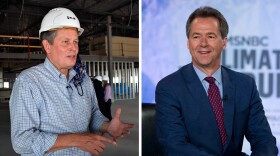
Jim Zarroli
Jim Zarroli is an NPR correspondent based in New York. He covers economics and business news.
Over the years, he has reported on recessions and booms, crashes and rallies, and a long string of tax dodgers, insider traders, and Ponzi schemers. Most recently, he has focused on trade and the job market. He also worked as part of a team covering President Trump's business interests.
Before moving into his current role, Zarroli served as a New York-based general assignment reporter for NPR News. While in this position, he reported from the United Nations and was also involved in NPR's coverage of Hurricane Katrina, the London transit bombings, and the Fukushima earthquake.
Before joining NPR in 1996, Zarroli worked for the Pittsburgh Press and wrote for various print publications.
He lives in Manhattan, loves to read, and is a devoted (but not at all fast) runner.
Zarroli grew up in Wilmington, Delaware, in a family of six kids and graduated from Pennsylvania State University.
-
States such as Montana, Arizona and North Carolina are experiencing a flood of campaign contributions from groups that don't have to reveal where the money's coming from.
-
With control of the Senate at stake, record amounts of outside money are flooding into races. In North Carolina, nearly $200 million has come in, dwarfing the money raised by the candidates.
-
Investors are also discouraged by the lack of progress in talks between Congress and the White House over another coronavirus relief bill.
-
The blue chip bank will claw back hundreds of millions of dollars in compensation from current and former executives over a financial scandal in Malaysia.
-
The two major political parties raise money differently. Republicans tend to get more money from older industries such as energy and manufacturing. Democrats do better with technology and health care.
-
The government shortfall for the fiscal year that just ended was more than triple that of 2019. The national debt of $21 trillion now exceeds the size of the U.S. economy.
-
This week major banks are expected to reveal profits in the third quarter of 2020. This data will shed light on how much the pandemic has affected consumer borrowing and spending.
-
The tax code allows wealthy people who live off investment income to pay taxes at a much lower rate than average people who earn salaries.
-
Stocks reversed Tuesday's losses amid word that the Trump administration was considering stand-alone bills to aid airlines and small businesses. The president had called off talks on a relief bill.
-
Texting has become a cheap and easy way for political campaigns to reach out to voters. But not everyone's happy about it.








